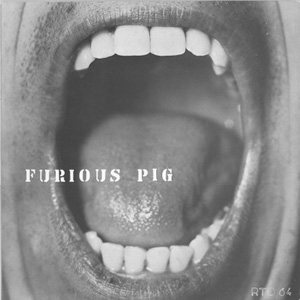|
Furious Pig Rock Magazine, November 1981 Furious Pig are a most hilarious group. It's not easy to explain just how funny they are. Well, seeing is believing... no, hearing is believing. Please listen to the flexidisc attached to this issue of the magazine. If you still don't get an idea, try their 3-track 12-inch EP, released on Rough Trade. (It says the playback speed is up to you, but 45rpm is the original speed.) If you don't end up in a fit of laughter, there's something wrong with you. Please go and see a shrink. But in order to really experience their riotousness, this time it's really the case of seeing is believing. Their live performance, singing (shouting) with the faces all red, bodies twisted, spits flying, never fails to bring on huge bursts of laughter from the audience. Each show is 15 to 20 minutes long, and their repertoire centres around vocal performances, with bits of percussion someone must have picked up off the streets (pieces of metal or wood, film cans, etc.) thrown in. Or sometimes they sing through cardboard tubes. Each action on stage is extremely funny to watch. 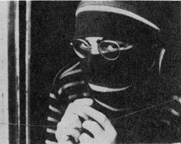
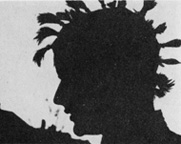
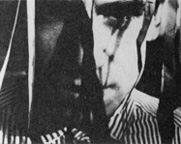
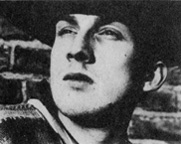
Cass, the jester-type with round, silver specs; Dominic with his many coloured ribbons hanging over his face; Martin has his hair divided in many strands with rubber bands, pointing in all directions, the base of which looking like a well-ordered rice field; and Steven who looks so serious in stark contrast to the rest of the gang (and thus making you laugh more): each has a different look, making up a whimsical quartet. At the end of the show they all leave the stage in coats, hats and sunglasses, snapping their fingers like some cool film characters - well, I say hats, but one of them is a woollen cap, the other a fighter pilot's helmet, and so on. Their stage show is entertaining all the way to the end. And the audience? First they are puzzled by the four people coming onstage without any instruments, dumbfounded when the performance begins, and after a while they burst out laughing, followed by cheers and applause - that's the usual pattern. Of course there are always some contrary people, so the venue gets filled with cheers and booing at the same time. There's no middle ground, it seems impossible to step back and watch the whole show with cold eyes. Furious Pig is a group that has developed out of the long friendship between Dominic (22), Cass (23), Steven (23) and his brother Martin (19). The kids started messing about with instruments five years ago, and sometimes during rehearsals they'd sing their parts rather than play on their instruments. "We started because it was good fun, and we thought it sounded good" so they started working on their voice-only repertoire 2 years ago. "We still play instrumets, we haven't given up playing or singing" says Dominic. Although they have been playing at school dance parties and christmas parties for the last five years, it is in this past year that they have started performing regularly. What instruments did they used to play? Everything, apparently: ie. guitar, bass, drums, (normal) vocals, plus tin cans, rattles, dustbin lids, whistles, and so on. I remember a reader's letter in NME from someone who went to school with them, according to whom their performance back then used to consist of lots of shouting and hitting various objects. They currently have a repertoire of 5 songs. There used to be more, but they stop doing a piece after 6 months, preferring to perform new pieces. So if you go and see them now, their set will be completely different from when I'm writing this. |
||
|
Dominic (D): The thing we do when we're making up a number is, we just see what noises we can make, because all people can make particular noises wich probably no one else can. That's something...
Steven (S): ... we aim for. D: Yeah, like Steven's noise... (Here Steven makes a sound, a cross between a rooster crowing and loud snoring.) D: That, none of us can do that, and we haven't known anyone else who can. Probably everyone has got these little things (that no one else can do). I'm quite interested in that people can make a noise, use different parts of body as an amplifier. You can make the sound eminate from here, or back here, or something. I'm interested in all that sort of thing, because then you can come up with even wierder noises." S: On our record we got our engineer to do a noise, because he had this particular sound which he could do, which none of us could possibly do. D: We're really into the idea of getting about a thousand people and we just supervise things. I'd love to hear even ten people doing it, but a huge number of people doing vocal numbers that we do, I'd find that most exciting." S: Because you don't have to be musical to do that. S: That's one thing people criticise us for, "anyone could do it" attitude. It's true, but doesn't matter. D: You've just got to try. | ||
|
Graham Lewis, who produced their EP, also contributed a continuous tone at the beginning of the track King Mother. According to Dominic (who I find looks a bit like Graham), "he was useless. Everytime he took a breath, he'd go off key". Anyway, although the record contains three of their classics, I don't think it reaches the same level of entertainment as their live shows. It's not just those unbelievable sounds and noises that they make, but seeing how they produce those sounds is a great part of the fun. I think their is an audio-visual entertainment, and taking the visuals away reduces the enjoyment. Whatever. At least the guys seem to have enjoyed the process of making the record. |
||
|
D: What we did with that (record) was basically record the things as they were. It wasn't so much what I'd call "making a record".
S: The performance is on the record, the actual sound. The standard of what we do is much, much better than we ever get live. Martin (M): You never actually hear them like that live. So I think that's good enough a reason for recording that. S: It's like that with any group, really. Live, people find them really exciting, etc., and the record can be disappointing. Cass (C): It's just totally different things. S: We'd like to keep on doing both, treating the two differently. Q: So what was the purpose of releasing the record? C: So that you could hear the songs. D: So that we could hear it. Well, we want to make a living doing this. To do that, you need to sell records, because playing live doesn't give you the money. M: Also, you can't reach nearly as many people playing live. S: When we compose (the pieces), the important thing is not that we're going to do them in front of people but that the sounds we're actually making. M: It's quite hard to listen to it, but I think it's worth it. D: Just what being good music is all of our interest, and... S: ... we believe in it. D: That's why we do it, because we want to make this music, and the other things are totally important too but they come after the music, in terms of why we're doing it. Q: I don't think records are the right medium for you, though. Video would be better, don't you think? D: Yes, but how could we make videos? There's no independent video... C: Yes there are. D: Are there? But not many people, public, have ability to watch videos, they don't have machines and things. I mean, I;d love to make a video. S: Although we obviously want to, as I said, earn a living from it, therefore to make money, we're not concerned with marketing what we do. It's just the case of recording, really. So it's not important to us if people like it or not. D: Yeah, these questions you're asking are things we don't actually think about a great deal. I mean, I don't. S: It's good, it's good... D: Yes, it's the first time we've had to think about this sort of thing, because mostly we just do it. Q: Would you call yourselves musicians, performance artists, or...? D: A year ago, I would have considered myself a musician, but it's not what I want to be particularly, because of what I think musicians are, which is basically technicians. I'm not very impressed by that sort of thing. We just create things and play them, I don't know what we are. It doesn't matter. S: People have always wanted to position us somewhere, put us somewhere, and when people ask me what we do, I have intense difficulty explaining, because you have to use words that exist (laughs). I don't feel we fit into those categories, at least I'd rather we didn't. M: Or we try not to. S: We make records and we play concerts. We're a rock group. M: Yeah, potentially. S: But that's not what we want to be. M: No, we want to be something totally different but we don't know what it is. We don't want to do things in a way that other people do. Unfortunately, bringing out a record is something thousands and thousands of people do, but maybe in years to come, we'll find a way of doing what we want to do in different ways than records and things Record live gigs, that sort of things. We try and do things differently, like everyone should, really. S: I would say we are musicians rather than anything else. D: Rather than rock stars. S: We're not actors, we're not... D: ...performance artists. S: No. Q: Entertainers? D: Well, it is entertainment. S: We are entertaining. It is entertainment, isn't it? D: Yeah, but that was not that definite. We've added little things to make it funny, like falling over and stuff. But originally we didn't think people were going to like it much. M: It was quite a shock that people did like it. S: The first time we did it to someone who hadn't heard it before in our house, and he was promoting a gig that we were going to do, we sang I Don't Like Your Face to him in our front room. And he became visibly really uncomfortable, you could see he hated every minute of it. So he said he wouldn't pay us for the gig and wanted to put us on the bottom of the bill. But... D: But it was a really successful gig, and after that, he sort of pretended he thought it was great all the time (laughs). S: Mind you, it must be pretty tough, siting on a chair and being shouted at. M: Just something we had to do. S: Well, he wanted to hear it, didn't know what we were going to do. Q: I can imagine people not knowing how to react the first time. How do you feel about the audience reaction at your gigs? S: People either seem to really like what we do, or hate it. D: Generally people seem to like the vocal stuff. M: They find something appealing about it. Lots of people think it's funny, whic it is. D: Even people who think we're just twats actually enjoy it, because they find it funny. M: Everyone at the record pressing plant hated it.
| ||
| There have been five reviews of their record in the music press, three of which slagged it off, and the remaining two journalists "kind of liked it but didn't really say it". On the other hand, most of their live reviews have been complimentary. | ||
|
D: So I think liking us is something to do with seeing us do it. Generally people think it's not music.
S: We think it's music. Music is the most important thing. As far as we're concerned, it's not theatre or entertainment, not particularly. |
||
| I ask them the stock question - who/what their influences are - but there doen't seem to be anything specific. They used to borrow bits off other people's songs and use them in disguised a form, like taking the rhythm off a vocal track of a song and applying it to the drums. Johnny So Long, included on the EP, for example, started off as a short improvisation by Cass, based on a folk song by the Bunch of Blue Ribbons. | ||
|
D: That kind of direct influence, yes, but general influence, there's nothing really.
S: Since we've been doing vocal music, we've heard things that are very similar. Ethnic music from other countries, from the Far East and Africa, but they haven't influenced the music we've done up to now. It just happens there's a lot in that kind of vocal music that's similar to ours. Just the feeling of it. We used to, and still do, take piss out of certain musical styles, like disco, etc., but not in... it was always an unserious thing. D: We take music seriously but not ourselves. It's obviousl we're not extremely serious people, which also influenced the music. S: Music should be good fun. Q: I bet your music is great fun to perform! D: Yes, it's very good. S: Physically, mentally, it's good. D: Gets rid of a headache... M: Gives you a sore throat... C: And people like it. M: Yeah, that's really enjoyable. D: Having people enjoy what you think is very good - it's not like making up a catchy tune and have someone enjoy that, that would be so easy. It's having someone enjoy what we think is worthwhile, and that's good. Q: Do you any kind of breathing exercises? D: Smoking. M: No, we don't. We occasionally gurgle. D: It's something we're vaguely concerned about, because we find when we're rehearsing our voices start to go. I Don't Like Your Face is a particularly tiring one to do. S: It's really fast. D: And it would be really nice to find out how you could do that without getting tired. It's more to do with breathing. I mean, I'd have to have voice training. S: None of us is very fit. I think if we're fitter, it would be easier, because it's physically so demanding. |
||
|
Just watching them perform live, it's obvious how physically demanding it must be for them. On the other hand, using the whole body and squeezing all that noise from the bottom of the guts as they do must be an exhilarating exercise, like spewing out all the toxins out of the body.
To my (another stock) question regarding interests outside of music, their answers are "... people...jokes... many things." So nothing specific, then. |
||
|
M: We're interested in anything. Just being in a group is quite interesting. By being in a group, I have to see many more people than I would probably have done if I went to college of something.
S: I think being in a group encourages you to think in different ways. It's like you experiment with sounds in music, and you do the same thing outside it as well." S: One thing I think is interesting is, two of us are Scorpios and two of us are Geminis. It's interesting because it goes with our personalities as well, for instance the two Scorpios are... D: ...insane. And they're not talking at the moment. | ||
|
Prior to the interview I had been wondering if some serious intellectual types may not be hiding behind those comedian facades, but there seems to be no deep and meaningful thoughts behind "kwaaaaak kwak kwak gyaaaaaaa wa wa bababababa pots pots pots". They obviously enjoy performing their pieces, and the audience have fun watching them. It's a wonderful situation, as they themselves admit. Regardless of what they consider themselves, I think they are true entertainers.
For now they insist "we are into making noises" and "it's easier making noises than using words" but, at the same time, they admit the way they work constantly changes, that their attitude, when they will work on new numbers, "will be a lot different, the words might perhaps be the most important thing in the next one." Well, whatever form it takes, I'll be looking forward to finding out what kind of show they'll produce to keep us entertained in future! |
||
|
(c) Akiko Hada 1981/2020 | ||
